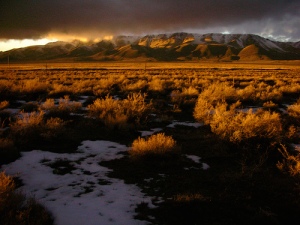“Pikas may act as early sentinels of changes in other montane mammal species”
In a 2003 peer-reviewed study of pika populations published in the Journal of Mammalogy Erik A. Beever, Peter F. Brussard and Joel Berger reported a 28 percent decrease in former pika populations located in the Great Basin.
The study set out to determine the distribution of pikas relative to the biogeography, climate and with regards to humans influence. No small task and one that really had not been tackled with regards to the pika.
“We revisited historical locations of pikas (Ochotona princeps) within the hydrographic Great Basin during summers of 1994–1999. Seven of 25 populations (28%) reported earlier in the 20th century appeared to have experienced recent extirpations,” the study said.
The populations that lived in lower elevations were often those later reported extinct. Also, lands located on the BLM had higher rates of pika extinctions than lands located elsewhere. Furthermore researchers found that pikas are stubborn and most do not move from the population where they were born. This means that if pikas need to move to higher ground to survive many will not do so.
Mountains to researchers are similar to island habitats in that life has adapted in a relatively isolated fashion. Earlier studies have shown that many mountain animals are capable of moving between and adapting to different mountain ranges. However, the American pika does not exhibit this characteristics.
The journal article explains how the pikas came to face is current plight by looking back at the animals historic range. Pikas have been apart of the American landscape for some estimated 500,000 years. These small round creatures once were widely distributed after a brief period of glaciation. But this pika Renaissance was not to last.
“Subsequent warming during the mid-Holocene forced pikas to retreat to higher latitudes and elevations (Grayson 1987; Hafner 1993, 1994). This retreat set the stage for the current relict, disjunct distribution of pikas in the Intermountain West,” the study said.
As temperatures heat up and as climate change is better understood it may be easier for researchers to draw conclusions on why the American pika is disappearing. For now though, researchers say, ” warmer temperatures seem likely to be contributing to apparent losses that have occurred at a pace significantly more rapid than that suggested by paleontological records.”
More to come on more recent studies and findings. Let me know if you come across anything relevent and interesting!




